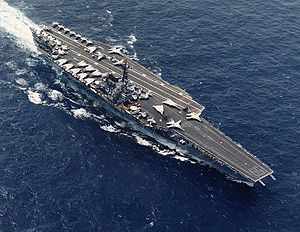
1,070Â ft (326.1Â m)
The Forrestal-class aircraft carriers were four aircraft carriers designed and built for the United States Navy in the 1950s. It was the first class of supercarriers, combining high tonnage, deck-edge elevators and an angled deck. The first ship was commissioned in 1955, the last decommissioned in 1998.
The Forrestal class was the first completed class of "supercarriers" of the Navy, so called because of their then-extraordinarily high tonnage (75,000 tons, 25% larger than the post-World War II-era Midway class), full integration of the angled deck a very large island and most importantly their extremely strong air wing (80–100 jet aircraft, compared to 65–75 for the Midway class and fewer than 50 for the Essex class). Forrestal and Saratoga were laid down as axial deck carriers and converted to angled deck ships while under construction; Ranger and Independence were laid down as angled deck ships and had various minor improvements compared to the first two. The most visible differences were between the first pair and second pair: the Forrestal and Saratoga were completed with two island masts, an open fantail and a larger flight deck segment forward of the port aircraft elevator; the Ranger and Independence had a single island mast, a more closed fantail (as seen in all carriers since) and a smaller flight deck segment forward of the port aircraft elevator. Compared to the Midway class, the Forrestals were 100 feet (30 m) longer and nearly 20 feet (6 m) wider abeam, resulting in a far more stable and comfortable aircraft platform even in very rough weather. When commissioned, the Forrestal-class ships had the roomiest hangar decks and largest flight decks of any carrier ever built. Because of their immense size they were built to a new, deep-hulled design that incorporated the armored flight deck